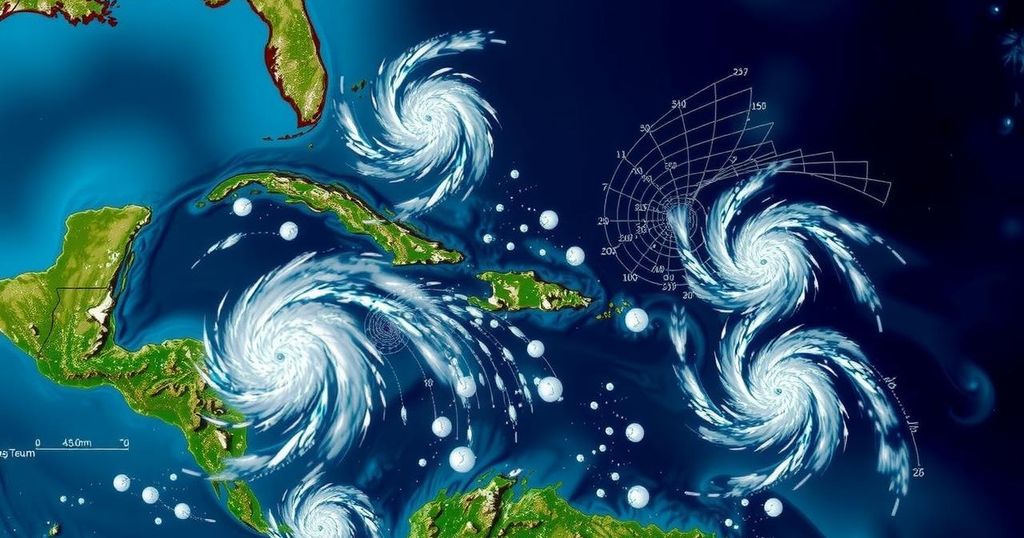2024 Atlantic Hurricane Season Concludes with 18 Named Storms

The 2024 Atlantic hurricane season culminated with 18 named storms, including 11 hurricanes and five major hurricanes, aligning with NOAA’s forecasts. Key events included record-breaking storms such as Hurricane Beryl, the earliest Category 5 hurricane, and Hurricane Helene’s unique pre-formation forecasting. The season highlighted advances in forecasting technology and underscored the growing importance of scientific preparedness against hurricane threats.
The 2024 Atlantic hurricane season has officially concluded, resulting in a total of 18 named storms, including 11 hurricanes and five categorized as major hurricanes. Despite this substantial tally, the outcome aligns with the forecasts by the National Oceanic and Atmospheric Administration (NOAA), which had indicated expectations of 14 named storms, seven hurricanes, and three major hurricanes. The season was characterized by notable impacts, including five landfalls on the continental United States, two of which were major hurricanes.
Matthew Rosencrans, NOAA’s lead hurricane forecaster, remarked on the season’s behavior, saying, “The impactful and deadly 2024 hurricane season started off intensely, then relaxed a bit before roaring back.” He attributed the temporary lull in storm activity to heightened winds and rainfall in Western Africa, which created adverse conditions for storm formation.
This season witnessed unprecedented occurrences, notably Hurricane Beryl, establishing a new record as the earliest Category 5 hurricane ever recorded in the Atlantic. Furthermore, Hurricane Helene earned recognition for being forecasted as a major hurricane prior to even attaining tropical depression status.
NOAA Administrator Rick Spinrad underscored the escalating necessity for precise scientific forecasting, emphasizing, “As hurricanes and tropical cyclones continue to unleash deadly and destructive forces, it’s clear that NOAA’s critical science and services are needed more than ever by communities, decision makers, and emergency planners.”
Among the hurricanes of the season, Hurricane Milton garnered attention for its extreme rapid intensification, where its wind speeds surged by an astonishing 90 miles per hour within a single day, accompanied by the generation of 46 tornadoes and severe flooding in Florida.
Dr. Michael Brennan, Director of NOAA’s National Hurricane Center, noted advancements in tracking technology, stating that “2024 preliminary data shows the most accurate NHC track forecasts ever issued at all forecast lead times.” The dedication of the Hurricane Hunter aircraft, which conducted numerous missions and deployed over 1,246 scientific instruments, significantly contributed to enhancing storm prediction and understanding.
While the number of named storms exceeded the standard averages, it remained within NOAA’s projected ranges for the 2024 season. In contrast, the Pacific hurricane season reported below-normal activity, with only 12 named storms in the eastern Pacific and just two in the central Pacific.
The Atlantic hurricane season typically spans from June 1 to November 30, during which meteorological organizations track and predict tropical cyclone activity. Historical data indicates that, on average, 14 named storms, seven hurricanes, and three major hurricanes occur each season. The 2024 season exhibited unusual patterns, merging unprecedented storm events with significant advancements in forecasting technology, leading to heightened preparatory measures from NOAA and local authorities.
The 2024 Atlantic hurricane season concluded with notable storm activity, characterized by 18 named storms and significant impacts on the continental United States. The alignment of the season’s activity with NOAA’s predictive models reflects ongoing advancements in hurricane forecasting technologies. The season’s record-breaking storms, particularly Hurricane Beryl, emphasize the urgent need for continued scientific research and preparedness in facing the challenges posed by climate-driven meteorological phenomena.
Original Source: caribbean.loopnews.com






